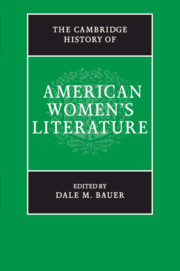Book contents
- Frontmatter
- Contents
- List of illustrations
- Acknowledgements
- Notes on contributors
- Introduction
- 1 The stories we tell: American Indian women's writing and the persistence of tradition
- 2 Women writers and war
- 3 American women's writing in the colonial period
- 4 Religion, sensibility, and sympathy
- 5 Women's writing of the Revolutionary era
- 6 Women writers and the early US novel
- 7 Women in literary culture during the long nineteenth century
- 8 Moral authority as literary property in mid-nineteenth-century print culture
- 9 The shape of Catharine Sedgwick's career
- 10 Writing, authorship, and genius: literary women and modes of literary production
- 11 Nineteenth-century American women's poetry: past and prospects
- 12 Transatlantic sympathies and nineteenth-century women's writing
- 13 Nineteenth-century African American women writers
- 14 Local knowledge and women's regional writing
- 15 Women and children first: female writers of American children's literature
- 16 US suffrage literature
- 17 American women playwrights
- 18 Turn-of-the-twentieth-century transitions: women on the edge of tomorrow
- 19 Accidents, agency, and American literary naturalism
- 20 The geography of ladyhood: racializing the novel of manners
- 21 Self-made women: novelists of the 1920s
- 22 Recovering the legacy of Zara Wright and the twentieth-century black woman writer
- 23 Jewish American women writers
- 24 Women on the breadlines
- 25 Modern domestic realism in America, 1950–1970
- 26 Lyric, gender, and subjectivity in modern and contemporary women's poetry
- 27 Contemporary American women's writing: women and violence
- 28 Asian American women's literature and the promise of committed art
- 29 Straight sex, queer text: American women novelists
- 30 Latina writers and the usable past
- 31 Where is she? Women/access/rhetoric
- 32 Reading women in America
- Index
- References
Introduction
Published online by Cambridge University Press: 28 September 2012
- Frontmatter
- Contents
- List of illustrations
- Acknowledgements
- Notes on contributors
- Introduction
- 1 The stories we tell: American Indian women's writing and the persistence of tradition
- 2 Women writers and war
- 3 American women's writing in the colonial period
- 4 Religion, sensibility, and sympathy
- 5 Women's writing of the Revolutionary era
- 6 Women writers and the early US novel
- 7 Women in literary culture during the long nineteenth century
- 8 Moral authority as literary property in mid-nineteenth-century print culture
- 9 The shape of Catharine Sedgwick's career
- 10 Writing, authorship, and genius: literary women and modes of literary production
- 11 Nineteenth-century American women's poetry: past and prospects
- 12 Transatlantic sympathies and nineteenth-century women's writing
- 13 Nineteenth-century African American women writers
- 14 Local knowledge and women's regional writing
- 15 Women and children first: female writers of American children's literature
- 16 US suffrage literature
- 17 American women playwrights
- 18 Turn-of-the-twentieth-century transitions: women on the edge of tomorrow
- 19 Accidents, agency, and American literary naturalism
- 20 The geography of ladyhood: racializing the novel of manners
- 21 Self-made women: novelists of the 1920s
- 22 Recovering the legacy of Zara Wright and the twentieth-century black woman writer
- 23 Jewish American women writers
- 24 Women on the breadlines
- 25 Modern domestic realism in America, 1950–1970
- 26 Lyric, gender, and subjectivity in modern and contemporary women's poetry
- 27 Contemporary American women's writing: women and violence
- 28 Asian American women's literature and the promise of committed art
- 29 Straight sex, queer text: American women novelists
- 30 Latina writers and the usable past
- 31 Where is she? Women/access/rhetoric
- 32 Reading women in America
- Index
- References
Summary
Why create a new Cambridge History of American Women's Literature? Why is this the time to analyze the breadth and range of scholarship that the last thirty years have inaugurated in American women's literature and to discuss what we have left to do? Because now is the time to move beyond 1980s paradigms and 1990s elaborations to include a wider vision of this literary history. Since 1980, mode after new mode of interpretation has been added to change how American women's writing might be studied, whether through new historicism or affect theory, including models of modern woundedness and “the female complaint.” Much important recovery work has already been done, giving us many authors to read and analyze, but much more remains: too few writers have been explored in their entirety (like Lydia Maria Child or Catharine Sedgwick). More important, as Susan Williams argues, thinking of women's writing as a non-oppositional strategy has helped us to begin to study women's writing, not in resistance to the male canon, but as a new field altogether. We are still discovering ways of historicizing and recombining this literature, rethinking contexts, categories, and juxtapositions. And perhaps most exciting these days is the reading of women transatlantically, hemispherically, or through “deep time,” giving us transnational, global, and comparative ideas about women's writing.
The impetus for this book is to assess the major renovation of US women's literature in the past thirty years.
- Type
- Chapter
- Information
- The Cambridge History of American Women's Literature , pp. 1 - 10Publisher: Cambridge University PressPrint publication year: 2012



